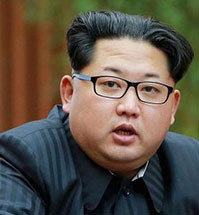SEOUL, (Reuters) – North Korea will immediately suspend nuclear and missile tests and abolish a nuclear test site in a bid to pursue economic growth and peace on the Korean peninsula, the North’s state media said yesterday, ahead of planned summits with South Korea and the United States.
North Korean leader Kim Jong Un said his country no longer needed to conduct nuclear tests or intercontinental ballistic missile tests because it has completed its goal of developing nuclear weapons, the Korean Central News Agency (KCNA) said.
North Korea said that to create an “international environment favorable” for its economy, it would “facilitate close contact and active dialogue” with neighboring countries and the international community.
It marked the first time North Korea directly addressed its nuclear weapons programmes and comes ahead of Kim’s planned summit with South Korean President Moon Jae-in next week and a meeting with U.S. President Donald Trump in late May or early June.
“The northern nuclear test ground of the DPRK (Democratic People’s Republic of Korea) will be dismantled to transparently guarantee the discontinuance of the nuclear test,” KCNA said after Kim convened a plenary session of the Central Committee of the ruling Worker’s Party on Friday.
“We will concentrate all efforts on building a powerful socialist economy and markedly improving the standard of people’s living through the mobilisation of all human and material resources of the country,” KCNA said.
Trump welcomed the statement and said he looked forward to a summit with Kim. “North Korea has agreed to suspend all Nuclear Tests and close up a major test site. This is very good news for North Korea and the World – big progress! Look forward to our Summit,” Trump said on Twitter.
South Korea said the North’s decision signified “meaningful” progress toward denuclearisation of the Korean peninsula and would create favourable conditions for successful meetings with it and the United States.
Japanese Prime Minister Shinzo Abe said he welcomed North Korea’s statement but it must lead to verifiable denuclearisation.
“This announcement is forward motion that I’d like to welcome,” Abe told reporters. “But what’s important is that this leads to complete, verifiable denuclearisation. I want to emphasise this.”
The United States, Japan and South Korea have historically been the main targets of Pyongyang’s anger.
North Korea has defended its nuclear and missile programmes as necessary deterrents against perceived U.S. hostility. It has conducted numerous missile tests, and last year it detonated its most powerful nuclear bomb.
The tests and escalating rhetoric between Trump and Kim raised fears of war until, in a New Year’s speech, the North Korean leader called for reduced military tensions. He later improved ties with South Korea and sent a delegation to the Winter Olympics in the South in February.
Nam Sung-wook, professor of North Korean Studies at Korea University in Seoul, said it could be considered “sensational” that Kim Jong Un personally declared plans to suspend nuclear development, but added that the North Korean leader’s remarks left a number of questions.
“It still does not seem clear if it means whether the North will just not pursue further development of its nuclear programmes in the future, or whether they will completely shut down ‘all’ nuclear facilities. And what are they going to do with their existing nuclear weapons?” Nam said.
North Korea has expressed its commitment to “complete denuclearisation” of the Korean peninsula and has not attached conditions, South Korean President Moon said on Thursday, but Washington has remained wary and vowed to maintain “maximum pressure” on Pyongyang.
The United States said on Thursday that in the run-up to Trump’s planned summit with Kim, countries should continue to put financial and diplomatic pressure on Pyongyang to surrender its banned nuclear weapons.
U.N. Security Council sanctions imposed on North Korea after its first nuclear test in 2006 and extended over the past decade have aimed to deny North Korea a considerable amount of international trade.
The North Korean ruling party’s plenary meeting on Friday was convened to discuss “policy issues of a new stage” to meet the demands of the current “important historic period,” KCNA said.

